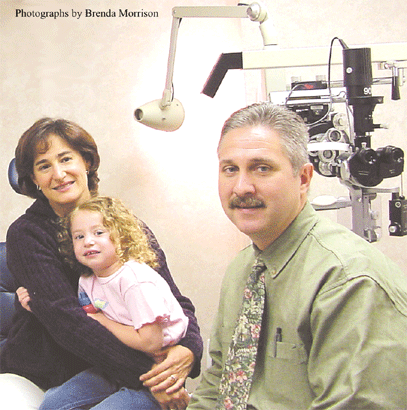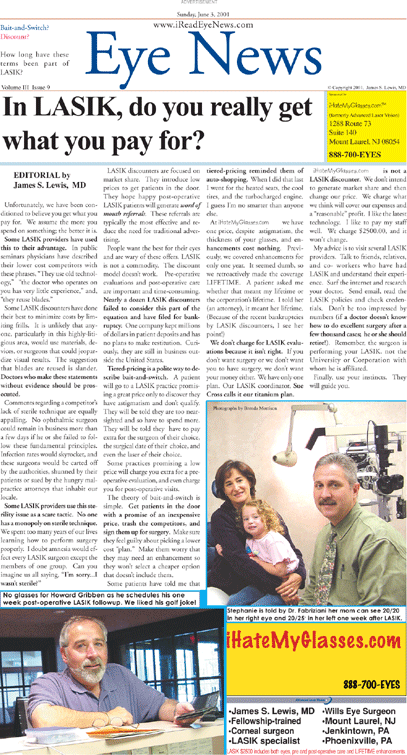Philadelphia / Bucks County LASIK Surgeon – Dr. James S. Lewis
Eye News Volume III Issue 9

In LASIK, do you really get what you pay for?
EDITORIAL by
James S. Lewis, MD
James S. Lewis, MD
Unfortunately, we have been conditioned to believe you get what you pay for. We assume the more you spend on something; the better it is.
Some LASIK providers have used this to their advantage. In public seminars physicians have described their lower cost competitors with these phrases, “They use old technology,” “the doctor who operates on you has very little experience,” and, “they reuse blades.”
Some LASIK discounters have done their best to minimize costs by limiting frills. It is unlikely that anyone, particularly in this highly-litigious area, would use materials, devices, or surgeons that could jeopardize visual results. The suggestion that blades are reused is slander. Doctors who make these statements without evidence should be prosecuted.
Comments regarding a competitor’s lack of sterile technique are equally appalling. No ophthalmic surgeon could remain in business more than a few days if he or she failed to follow these fundamental principles. Infection rates would skyrocket, and these surgeons would be carted off by the authorities, shunned by their patients or sued by the hungry malpractice attorneys that inhabit our locale.
Some LASIK providers use this sterility issue as a scare tactic. No one has a monopoly on sterile technique. We spent too many years of our lives learning how to perform surgery properly. I doubt amnesia would effect every LASIK surgeon except the members of one group. Can you imagine us all saying, “I’m sorry…I wasn’t sterile?”
LASIK discounters are focused on market share. They introduce low prices to get patients in the door. They hope happy post-operative LASIK patients will generate word of mouth referrals. These referrals are typically the most effective and reduce the need for traditional advertising.
People want the best for their eyes and are wary of these offers. LASIK is not a commodity. The discount model doesn’t work. Pre-operative evaluations and post-operative care are important and time-consuming. Nearly a dozen LASIK discounters failed to consider this part of the equation and have filed for bankruptcy. One company kept millions of dollars in patient deposits and has no plans to make restitution. Curiously, they are still in business outside the United States.
Tiered-pricing is a polite way to describe bait-and-switch. A patient will go to a LASIK practice promising a great price only to discover they have astigmatism and don’t qualify. They will be told they are too nearsighted and so have to spend more. They will be told they have to pay extra for the surgeon of their choice, the surgical date of their choice, and even the laser of their choice.
Some practices promising a low price will charge you extra for a pre-operative evaluation, and even charge you for post-operative visits.
The theory of bait-and-switch is simple. Get patients in the door with a promise of an inexpensive price, trash the competitors, and sign them up for surgery. Make sure they feel guilty about picking a lower cost “plan.” Make them worry that they may need an enhancement so they won’t select a cheaper option that doesn’t include them.
Some patients have told me that tiered-pricing reminded them of auto-shopping. When I did that last I went for the heated seats, the cool tires, and the turbocharged engine. I guess I’m no smarter than anyone else.
At iHateMyGlasses.com we have one price, despite astigmatism, the thickness of your glasses, and enhancements cost nothing. Previously, we covered enhancements for only one year. It seemed dumb, so we retroactively made the coverage LIFETIME. A patient asked me whether that meant my lifetime or the corporation’s lifetime. I told her (an attorney), it meant her lifetime. (Because of the recent bankruptcies by LASIK discounters, I see her point!)
We don’t charge for LASIK evaluations because it isn’t right. If you don’t want surgery or we don’t want you to have surgery, we don’t want your money either. We have only one plan. Our LASIK coordinator, Sue Cross calls it our titanium plan.
iHateMyGlasses.com is not a LASIK discounter. We don’t intend to generate market share and then change our price. We charge what we think will cover our expenses and a “reasonable” profit. I like the latest technology. I like to pay my staff well. We charge $2500.00, and it won’t change.
My advice is to visit several LASIK providers. Talk to friends, relatives, and co- workers who have had LASIK and understand their experience. Surf the internet and research your doctor. Send email, read the LASIK policies and check credentials. Don’t be too impressed by numbers (if a doctor doesn’t know how to do excellent surgery after a few thousand cases; he or she should retire!). Remember, the surgeon is performing your LASIK, not the University or Corporation with whom he is affiliated.
Finally, use your instincts. They will guide you.
Some LASIK providers have used this to their advantage. In public seminars physicians have described their lower cost competitors with these phrases, “They use old technology,” “the doctor who operates on you has very little experience,” and, “they reuse blades.”
Some LASIK discounters have done their best to minimize costs by limiting frills. It is unlikely that anyone, particularly in this highly-litigious area, would use materials, devices, or surgeons that could jeopardize visual results. The suggestion that blades are reused is slander. Doctors who make these statements without evidence should be prosecuted.
Comments regarding a competitor’s lack of sterile technique are equally appalling. No ophthalmic surgeon could remain in business more than a few days if he or she failed to follow these fundamental principles. Infection rates would skyrocket, and these surgeons would be carted off by the authorities, shunned by their patients or sued by the hungry malpractice attorneys that inhabit our locale.
Some LASIK providers use this sterility issue as a scare tactic. No one has a monopoly on sterile technique. We spent too many years of our lives learning how to perform surgery properly. I doubt amnesia would effect every LASIK surgeon except the members of one group. Can you imagine us all saying, “I’m sorry…I wasn’t sterile?”
LASIK discounters are focused on market share. They introduce low prices to get patients in the door. They hope happy post-operative LASIK patients will generate word of mouth referrals. These referrals are typically the most effective and reduce the need for traditional advertising.
People want the best for their eyes and are wary of these offers. LASIK is not a commodity. The discount model doesn’t work. Pre-operative evaluations and post-operative care are important and time-consuming. Nearly a dozen LASIK discounters failed to consider this part of the equation and have filed for bankruptcy. One company kept millions of dollars in patient deposits and has no plans to make restitution. Curiously, they are still in business outside the United States.
Tiered-pricing is a polite way to describe bait-and-switch. A patient will go to a LASIK practice promising a great price only to discover they have astigmatism and don’t qualify. They will be told they are too nearsighted and so have to spend more. They will be told they have to pay extra for the surgeon of their choice, the surgical date of their choice, and even the laser of their choice.
Some practices promising a low price will charge you extra for a pre-operative evaluation, and even charge you for post-operative visits.
The theory of bait-and-switch is simple. Get patients in the door with a promise of an inexpensive price, trash the competitors, and sign them up for surgery. Make sure they feel guilty about picking a lower cost “plan.” Make them worry that they may need an enhancement so they won’t select a cheaper option that doesn’t include them.
Some patients have told me that tiered-pricing reminded them of auto-shopping. When I did that last I went for the heated seats, the cool tires, and the turbocharged engine. I guess I’m no smarter than anyone else.
At iHateMyGlasses.com we have one price, despite astigmatism, the thickness of your glasses, and enhancements cost nothing. Previously, we covered enhancements for only one year. It seemed dumb, so we retroactively made the coverage LIFETIME. A patient asked me whether that meant my lifetime or the corporation’s lifetime. I told her (an attorney), it meant her lifetime. (Because of the recent bankruptcies by LASIK discounters, I see her point!)
We don’t charge for LASIK evaluations because it isn’t right. If you don’t want surgery or we don’t want you to have surgery, we don’t want your money either. We have only one plan. Our LASIK coordinator, Sue Cross calls it our titanium plan.
iHateMyGlasses.com is not a LASIK discounter. We don’t intend to generate market share and then change our price. We charge what we think will cover our expenses and a “reasonable” profit. I like the latest technology. I like to pay my staff well. We charge $2500.00, and it won’t change.
My advice is to visit several LASIK providers. Talk to friends, relatives, and co- workers who have had LASIK and understand their experience. Surf the internet and research your doctor. Send email, read the LASIK policies and check credentials. Don’t be too impressed by numbers (if a doctor doesn’t know how to do excellent surgery after a few thousand cases; he or she should retire!). Remember, the surgeon is performing your LASIK, not the University or Corporation with whom he is affiliated.
Finally, use your instincts. They will guide you.

No glasses for Howard Gribben as he schedules his one week post-operative LASIK followup. We liked his golf joke!

Stephanie is told by Dr. Fabriziani her mom can see 20/20 in her right eye and 20/25- in her left one week after LASIK.

Dr. Lewis’ extensive education and experience allow him to offer his laser eye surgery Philadelphia patients a variety of sophisticated procedures, including LASIK and Epi-LASIK. In addition, he has considerable experience with Visian ICL procedure and is regarded as a foremost ICL Philadelphia expert.

